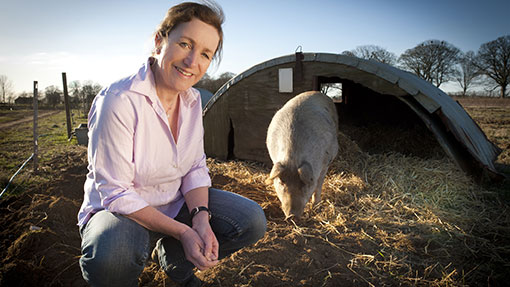Opinion: Farmers are never too old to learn

Education, education, education. That was the headline from Tony Blair’s speech in 2001, boasting of Labour’s commitment to schooling and echoed subsequently by David Cameron. My question now is how much do some people really want children to learn?
A friend informed me about a farmer whose son had just finished an agricultural course at a leading college. The farmer claimed the course was rubbish and that his son was learning far more now that he’d returned to the family farm. This was proven (in his eyes) by the fact that he could plough a field really well.
How sad. Yes, we all need good ploughmen. But with the advent of new technology and satnav in tractors, the ploughman’s job may well be virtually obsolete in less than 10 years. Agricultural college or university is generally about so much more than learning the basics.
Children will now be paying in excess of £36,000 to attend a standard three-year university course and they are starting to consider the value of this type of further education. Potential students are looking much closer at the job possibilities, and rightly so.
I went to Reading University and my two eldest have both attended uni. It has taught them to be independent, they now have a diverse network of contacts and it has opened their eyes to the wider world and the opportunities.
If the lad mentioned above had never gone to college and had stayed working on the family farm, the opportunity to grow and learn could have been denied – unless his parents were particularly forward-thinking, of course.
Education on the farm is part of what we are about at The Pink Pig. We welcome more than 1,000 schoolchildren every year to learn about food and farming. I was rendered speechless (almost unheard of) by a teacher from a local school in Scunthorpe who insisted they did not want to see “animals fornicating” or “animal genitals” during their tour.
My mum, who runs a children’s park farm down south, also received a letter of complaint from a lady who said that her daughter had been traumatised by the sight of a stallion mounting a mare in the field. She requested that this type of behaviour be stopped forthwith.
We have obviously taken all of this into account – bromide is going to be given to the ponies in their tea; the six-foot rule (allowing no male/female contact) is to be made mandatory on the farm, and pants are to be worn by animals at all times.
Nature is natural and children should be aware of this. Some teachers and parents are very worried about the connection between live animals and the butcher’s counter. In the 13 years that we have been showing children around, the most commonly-asked question (especially from boys) is “how do you kill the chickens/pigs?”. We answer honestly and in a straightforward manner and it is always accepted maturely.
We often receive letters and drawings after school visits and time after time we are told that the highlight of the trip was when the “pig weed or pooed” or took a bath in the water trough. Luckily they seem to remember what bread is made of, too. This is real life and should be celebrated in all its glory.
I believe that education continues throughout your life. Judging the Local Food Farmer category in the Farmers Weekly Awards recently was a pleasure, as inspiration appears from every direction when you talk to the amazing finalists.
We visited a truly extraordinarily enthusiastic family in Scarborough with one of the best coffee shop views in the country. They had converted their sitting room to make way for the tea room and now share the upstairs with their three teenage children – if that had been my family, murder would ensue!
We visited a dairy farmer creating amazing ice cream from a small herd of cows. We tasted more than 12 different flavours (it would have been rude not to), proving that a great, profitable business can be created on a small farm.
The last visit was to a farm shop near Bath, where the community was closely involved and the attention to detail and innovation was outstanding. We took loads of photos and I will be borrowing lots of ideas. It was an exhausting couple of days but we learnt so much.
Teaching is continuing here today on the farm. A coachload of children have just pulled up for a school visit – so excuse me while I ensure that all piglets are suitably attired and have been fully primed not to offend.
Sally and husband Andrew farm 364ha just outside Scunthorpe in North Lincolnshire. They have a farm shop, The Pink Pig Farm (a former winner in the diversification category of the Farmers Weekly Awards), with a 90-seater café and farm trail. Sally is chairman of the Farmers’ Retail and Markets Association (Farma).
